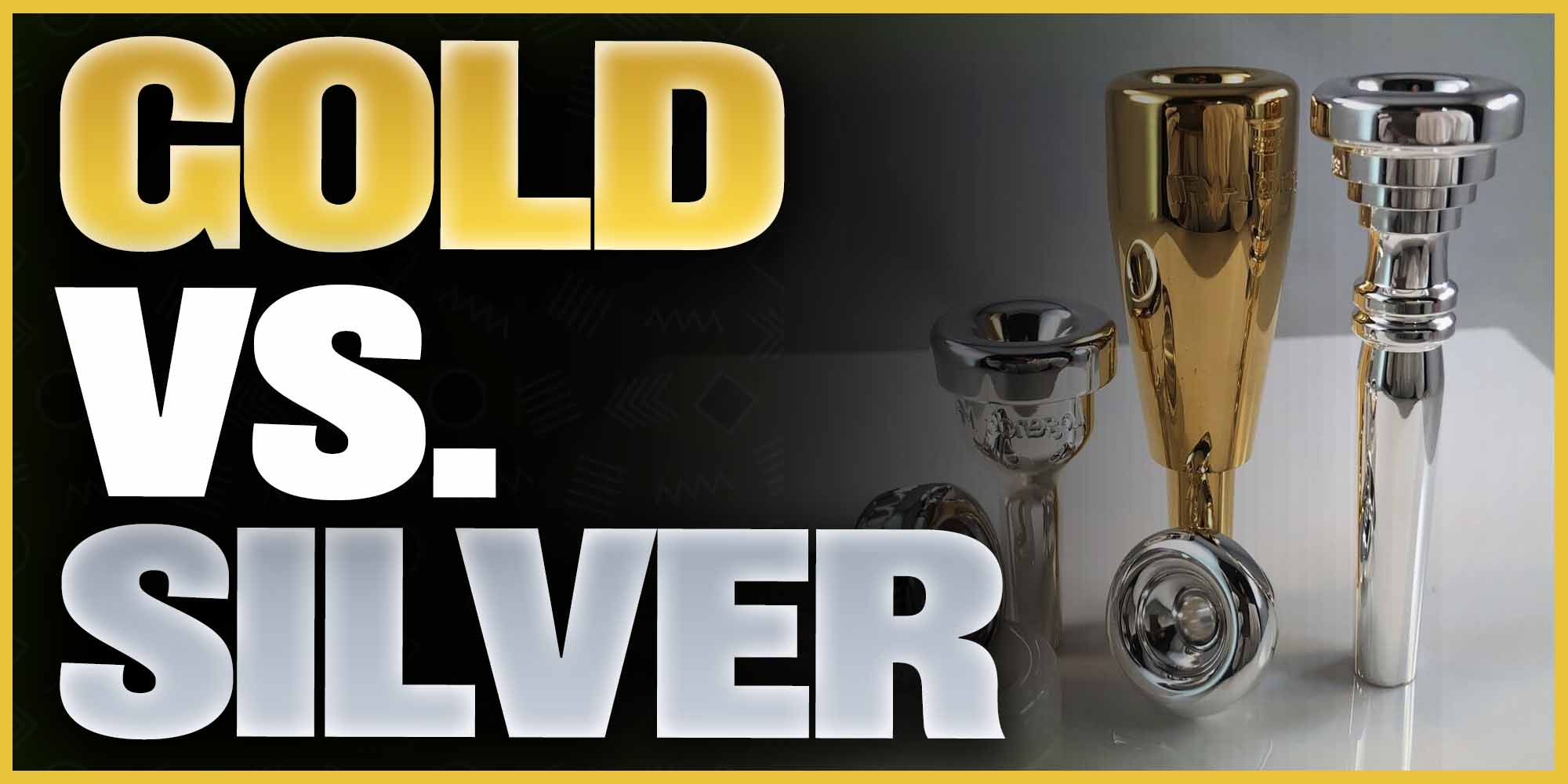
Gold & Silver Trumpet Mouthpiece: What's the difference?
What's the difference between a gold and silver mouthpiece?
Let's find out.
Although trumpeters typically select their mouthpieces based only on personal tastes, it is critical to understand how the mouthpieces are made.
Mouthpieces are among the most significant components of brass instruments!
All trumpets, of course, have different mouthpieces of varying diameters.
It is critical to study trumpets before acquiring one.
The difference between gold and silver mouthpieces:
| Property | Gold Mouthpiece | Silver Mouthpiece |
| Weight | Heavier | Lighter |
| Density | Denser | Less Dense |
| Warmth | Warm | Cool |
| Purity | Less Copper | More Copper |
Older mouthpieces can make a huge difference!
This comparison is based on experienced brass players and brand-new brass mouthpieces.
(Also note: When making music, the difference may seem like only a bit, but nickel/silver is so different.)
First, let's get into the dynamics of how mouthpieces work for full clarity:
Want to get your music on active & relevant playlists that actually get results?
Get your music heard now 👇
How do mouthpieces work?
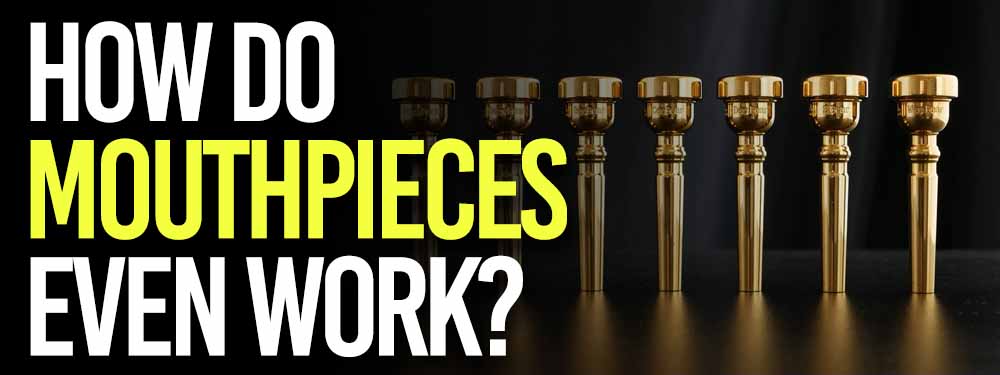
Brass musicians are using the breath to generate sound but instead of blowing out reeds the player uses metal cups that vibrate their mouths.
The mouthpiece increases the buzz of the lips, creating a sound. When used with the same instrument, various mouthpieces generate distinct tones.
The mouthpiece is a circular hole surrounded by a rim that connects to the instrument via a semi-spherical or conical cavity known as the cup.
A smaller hole (the neck) passes from the cup into a tapered cylindrical tunnel known as the backbore.
To improve resonance, lower instruments feature bigger mouthpieces (see the pitch of brass instruments).
Mouthpieces are chosen based on the player's embouchure.
The gold plating makes EVERYBODY's life 100x better with lip pressure.
Your silver-plated mouthpiece will play pretty much the same (though, many trumpet players prefer gold.)
Watch the full mouthpiece review below.👇
What metal is a trumpet mouthpiece made of?
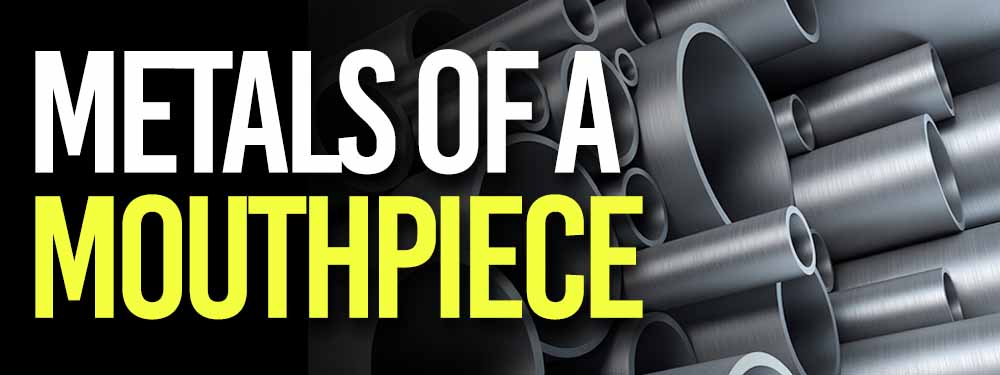
The bulk of mouthpieces is composed of brass rather than silver.
Other materials, such as solid silver and hard metal, have been used in some.
These mouthpieces are more pleasant on the lips, especially when used for an extended period of time.
Other materials, other than metal, are constructed of wood and plastic and can be used to play in the chilly or cold environment of the mouthpiece's mouthpiece.
These mouthpieces provide a more forceful sound than hard metal mouthpieces, which are more comfortable.
Raw brass mouthpieces with a gold-plated rim are common for raw brass trumpets.
Silver plating is incredibly durable when done properly and will give many years of dependable performance.
Stainless steel (the material used for pots and pans) is what many players are accustomed to.
Most players like a heavier mouthpiece with a darker tone.
This really lets trumpet players produce a real difference in sound levels.
Is brass mouthpiece safe?
Brass is the most often used material in trumpet construction, however, gold and silver trumpets are also popular.
Brass is typically used on yellow brass which is 70% copper and 30% zinc.
Lead has been demonstrated to be toxic in trace amounts of brass. Unless exposed to greater amounts of copper, the copper content of a metal mouthpiece may have no major detrimental consequences.
Longer contact may not be the greatest option since allergies may develop.
However, lead can cause brain damage or developmental difficulties in young children in rare situations.
Is it worth the music?
Exotic metals found in central Texas are decent for you.
In cold temperatures, this can change how your music comes out.
Are gold mouthpieces better than silver?

Should you use a gold mouthpiece cup instead of silver?
Unlike silver, gold plating the lips may soon warm up. Gold is more flexible than silver because it has less friction. As a result, silver-plated mouthpieces have much more secure properties, a more stable grip, and deeper colors.
So should you use a gold-plated mouthpiece then?
Benefits of using a gold mouthpiece
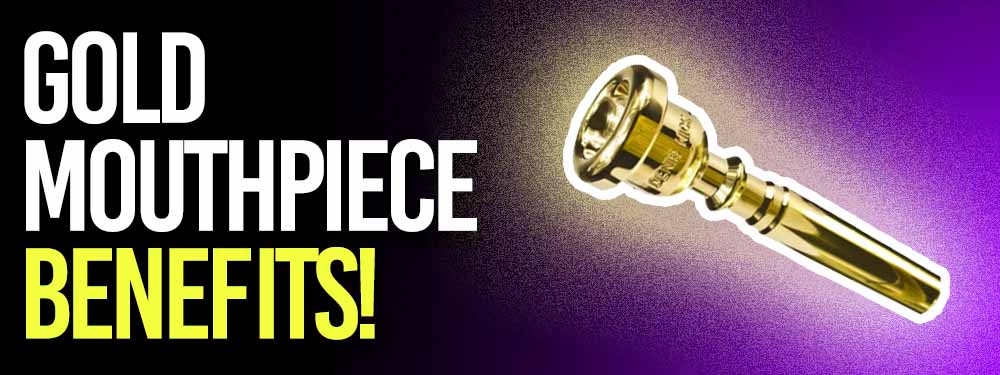
The level of friction of a gold-plated mouthpiece is lower than that of silver.
It's so much "slicker."
Most individuals believe that a gold mouthpiece feels warmer than a silver mouthpiece.
They have a 'warmer' sensation because gold conducts heat effectively and hence warms up faster than a standard mouthpiece.
It also does not corrode or tarnish like silver, so you may keep it indefinitely if properly cared for.
How much silver is in a Trumpet mouthpiece?
Is a silver mouthpiece actually silver?
Most silver mouthpieces have 92% of sterling silver content.
Silver represents 5% of the market, whereas gold has 7%.
Copper accounts for a modest percentage of all metals (excluding silver plating.)
Silver is 25% thicker than brass, resulting in a lighter mouthpiece with low volume.
Aside from that, they have beneficial benefits for playing!
Why are trumpet mouthpieces made of silver?
Instead of pure gold, most mouthpieces are gold-plated.
The gold plating around the rim lends a touch of class to the mouthpiece's appearance.
It's difficult to top for beautiful, crisp high notes and a smooth tone.
Brass mouthpieces are generally polished in silver to decrease costs and improve tone characteristics. Although gold-plated silver doesn't have the most comfort or cost of gold, it offers qualities that improve the playing experience.
However, the weight and rim size may make it difficult for certain players to move into lower musical areas.
Should you just use a gold-plated silver mouthpiece?
Gold plating is also more expensive than the norm, making it a better purchase for experienced trumpet players than for beginners.
The gold plating around the rim lends a touch of class to the mouthpiece's appearance.
It's difficult to top for beautiful, crisp high notes and a smooth tone.
I recommend you buy a gold-plated silver mouthpiece.
However, the weight and rim size may make it difficult for certain players to move into lower musical areas.
It is also more expensive than the norm, making it a better purchase for experienced trumpet players than for beginners.
The biggest difference between the two is how your skin will feel when making a sound.
If you use the silver plate mouthpiece from Thu-Mar then Fri-Mar one other horn.
5 most popular trumpet mouthpieces!
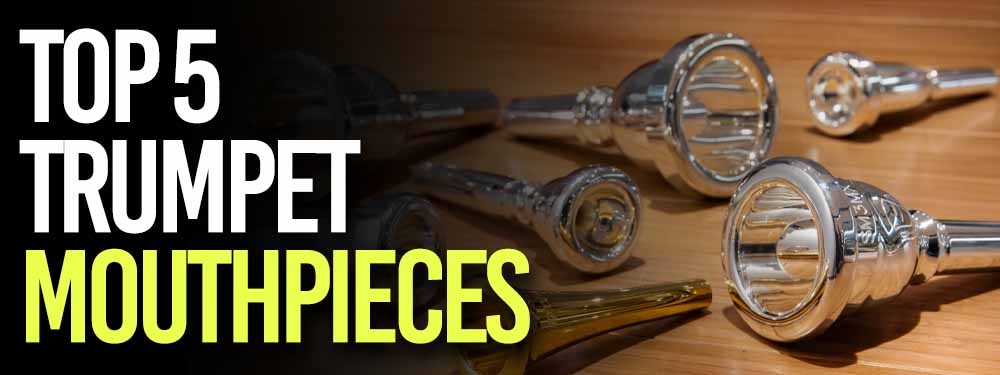
Looking for some decent silver-plating brass mouthpieces?
Here are the 5 most popular trumpet mouthpieces:
| Mouthpiece Supplier | Price |
| Yamaha YAC TR14A4A |
$49.99 |
| Vincent Bach Trumpet Mouthpiece | $78.29 |
| Bach Trumpet Mouthpiece | $62.00 |
| Bach 351 Trumpet Mouthpiece - 3E | $93.55 |
| Jupiter 3C mouthpiece | $40.00 |
These brass mouthpieces are some of the best trumpet mouthpieces on the market!
Not only are they silver plates and brass mouthpieces, but they have also been reviewed and tested by the masses.
These each sound similar in tone, but the material composition of the trump mouthpiece is different.
Since the stainless steel mouthpieces have different materials mixed, then some will be warm and others cold.
Most players prefer to play with trumpet mouthpieces at a physical instrument store.
This lets you feel the material up close, and play with full embouchure.
The difference in making music with this silver horn is how your skin feels.
Each adds a bit of comfort and gives you more practice stamina.
Do brass mouthpieces have lead?

The brass used in musical instruments includes around 35% of the lead utilized.
Brass is 'free to turn' on lead, allowing for effortless turns.
Brass becomes extremely difficult to cut without the presence of lead. The brass used in the musical instrument business contains between 2% and 3% lead.
The lead is there to make the brass machinable, or "free turning."
As a result, it has a lengthy history of use in the realm of brass instruments.
Summary
Just remember: silver-plated mouthpieces tend to offer a layer of protection.
Since it's silver-plated, your mouth is only contacting the silver plate.
Dangers start to come later once the silver plating begins to wear and oxidize...
At this point, you're exposing yourself to lead.
This is the main reason I recommend you use gold-plated mouthpieces for your trumpet.
This is true, especially in French horn mouthpieces!
I say stick to bringing a trumpet player, so you don't need to buy a different gold plate trumpet mouthpiece.
Now you have all the knowledge about gold and silver mouthpieces!
Get your music on playlists now.
It’s time you get your exposure and listeners up - playlisting by Boost Collective has been trusted by 50,000+ artists worldwide.
It’s easy: Search your song, get on playlists, and track your campaign.
What’re you waiting for? Tap in - and get added to playlists in 24 hours.
Join Boost Collective for free here.



